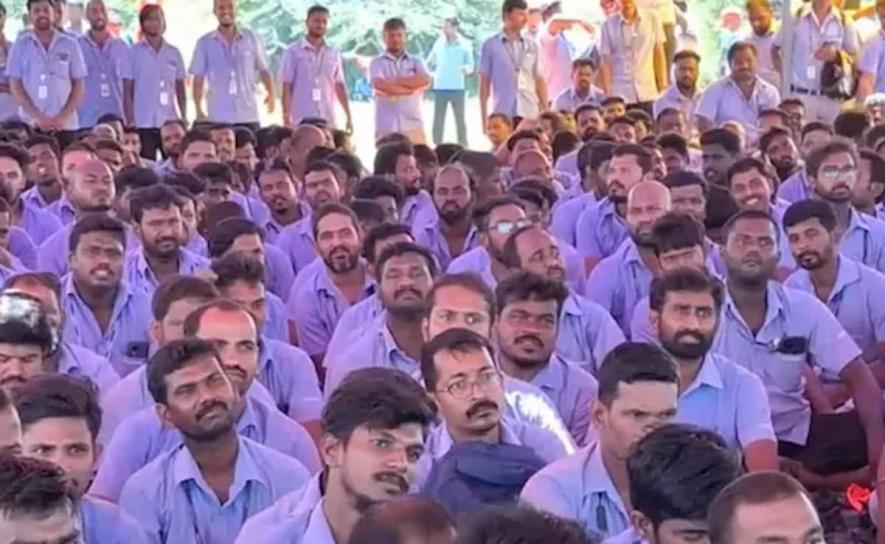TN: Significance of Samsung India Union’s Struggle

Image Courtesy: Peoples Democracy
On May 19, 2025, the Samsung India Workers’ Union (SIWU), affiliated to the Centre of Indian Trade Unions (CITU), secured a landmark wage agreement after a protracted struggle against the Samsung management. This agreement, mediated by the Tamil Nadu government, granted workers an overall wage hike of Rs. 18,000 over three years, alongside benefits, such as special promotions, enhanced leave entitlements, and improved working conditions.
While the mainstream media seeks to portray this as a “mutual agreement”, the settlement was, in reality, a concession wrested from capital through relentless struggle by SIWU and the solidarity of fraternal organisations of the working people.
A Brief History of SIWU’s Struggle
The proximate roots of the struggle lie in the Samsung management’s ‘super exploitative’ labour practices at its Sunguvarchatram factory in the outskirts of Chennai in Tamil Nadu, as per reports. The Samsung factory’s 1,800 permanent workers, producing refrigerators, televisions, and washing machines for the world market, faced stagnant wages, ‘super-exploitative’ labour practices, and systematic denial of union rights. For 16 years, annual wage increments rarely exceeded Rs. 3,000, as per SIWU.
In June 2024, the workers of this Samsung factory began efforts to unionise, seeking affiliation with CITU. Their demand was simple: recognition of their constitutional right to form a union, as guaranteed by the Trade Unions Act of 1926. However, the Samsung management reportedly sought to initially suppress these efforts with the support of the state government. When these efforts failed, the Samsung management is said to have tried to set up a ‘puppet union’ and reportedly sought to coerce workers to join it.
Read Also: CITU Calls for Release of Detained Striking Workers of Samsung in Tamil Nadu
SIWU said the state government delayed the union’s registration for 212 days—far beyond the legally mandated 45 days.
The workers responded with strikes, protests, and a 38-day sit-in, braving ‘state repression and management intimidation’. The legal battle reached the Madras High Court, where lawyers appearing on behalf of SIWU argued that Samsung management’s actions violated constitutional guarantees on the formation of unions.
The Madras High Court’s eventual ruling in December 2024, ordering the SIWU’s registration, was the first victory. The SIWU’s registration on January 27, 2025 was the second victory.
The union alleged that the Samsung India management tried to retaliate by suspending 25 union leaders and maintaining a discriminatory wage system. According to this “two-wage” policy—pro-management workers, who were a negligible minority, received a higher wage, in an effort to undermine SIWU. The SIWU responded with strikes, other types of mass mobilisations and deployment of procedures to deal with industrial disputes as allowed by the law. This compelled the state government to initiate mediation.
Read Also: Are Strikes Bad for Business? Not in TN That Tops in Number of Factories and Strikes: Report
The success in the May 19, 2025 negotiations is being termed as the third victory for SIWU. The agreement reached therein resulted in wage hikes of Rs.18,000 spread over three years, reinstatement promises for suspended workers, and an end to discriminatory practices by the Samsung management. However, past experience indicates that the struggle of SIWU will continue to both secure and consolidate this victory.
Fight Against Neoliberal Projects in India
SIWU’s victory has deep implications for India’s working people and their struggles. The proliferation of the neoliberal project in India has involved an offensive by capital to try and roll back whatever gains had been achieved by the working people in the country.
In this context, some states in India, including Tamil Nadu, have emerged as centres of labour arbitrage, as part of the so-called China-Plus-One strategy of multinational corporations to partially reconfigure global production networks, especially in the lower and lower-middle reaches of the relevant technological ladder.
Therefore, it was not surprising that local representatives of the neo-fascist dispensation, which is second to none in its obsequiousness vis-à-vis metropolitan capital, were egging on the state government to carry out a harsh crackdown on SIWU, as is their wont in states that it rules, especially Gujarat.
But the Dravida Munnetra Kazhagam (DMK)-led state government of Tamil Nadu was reportedly hesitant to unleash “full-spectrum repression”. The DMK is in a long-term political alliance, directed against the neo-fascist dispensation, with the Left parties and other fraternal organisations, who were firmly supporting SIWU. Therefore, in a reversal of the usual trend regarding alliances among non-Left parties, the Left was able to exercise effective political persuasion in ways that meaningfully complemented SIWU’s struggle. Consequently, the DMK-led state government was impelled to reverse its previous policies in this regard and engage in purposeful mediation.
The larger macroeconomic context of the struggle of SIWU involves the dual role of wages as both a part of the cost of production and a source of demand. Wage increases and better working conditions, which enable increases in labour productivity, if generalised, can increase macroeconomic demand in ways that do not necessarily negate the rationale of labour arbitrage. If this generalisation impels an ascent of the technological ladder through an industrial policy that is not beholden to metropolitan capital, then it will be possible to decisively break with the neoliberal project.
Successful struggles by unions, such as SIWU, that go hand in hand with the necessary political-organisational consolidation of the political organisations of the working people are necessary steps on the path to craft such a break with the neoliberal project.
The writer is Professor, Department of Economics, Satyawati College, University of Delhi. The views are personal.
Get the latest reports & analysis with people's perspective on Protests, movements & deep analytical videos, discussions of the current affairs in your Telegram app. Subscribe to NewsClick's Telegram channel & get Real-Time updates on stories, as they get published on our website.
























